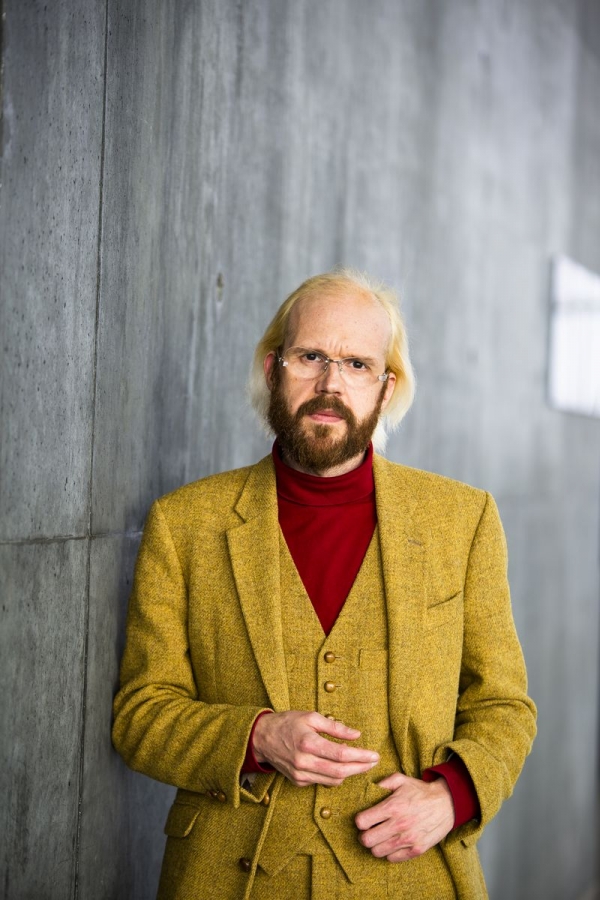Today a new three party right-wing coalition government takes power in Iceland. The coalition government of the conservative Independence party, the center-right Restoration and Bright Future, a small centrist party, replaces the center-right coalition of the Independence party and the centrist Progress party. The outgoing coalition was forced to call early elections after the Prime Minister, the chairman of the Progress Party was revealed to have kept significant holdings in tax-havens secret from the public.
Read more: New right-wing coalition formed, former punk-rocker becomes government minister
However, the cloud of the Panama papers also hangs over the current coalition.
Meet the new boss. Same as the old boss.

International media have pointed out that Bjarni Benediktsson the Prime Minister in the in the incoming coalition government was also named in the Panama Papers. The US newspaper the Washington Post covers the news of the new coalition under the headline Iceland ousted one leader named in the Panama Papers, but ended up with another on the list.
As the Washington Post argues, many expected a anti-establishment revolt in Iceland following the massive protests in April, following the revelations of the Panama Papers. Many expected the Pirate Party to be the vehicle of this revolt. Polls had shown the party with as much as 30-40% of the vote, but the support of the party dwindled as the elections neared, and on election day the party managed to secure only 14.5%, making it the third largest party in Parliament.
The protest vote split

One reason for the poor showing of the Pirate party is that its voters tend to be younger, and young voters don't show up to vote in the same numbers as older voters. Another reason is that the centrist Bright Future and the newly formed center-right Reformation captured large sections of the protest and reform vote.
While the leftist Left Green Movement and the anti-establishment Pirate Party tried to make the Panama Papers and the need to fight tax evasion and corruption into the main issues in the November 29 elections, Restoration and Bright Future championed on far simpler slogans emphasizing the need for reform.
Read more: The support for Iceland's Pirate Party is soaring, has never been measured higher
The two parties focused on the need to reform agricultural policy and ease restrictions on the importation of foreign foodstuffs, a pocket-book issue which enjoys widespread support. The other main issue the two parties emphasized was the need to make changes to the fisheries policy and the transferrable quota system which has brought with it enormous concentration of wealth in the hands of the owners of the largest fishing companies.
Punk Rocker in a yellow suit to the rescue

Bright Future also seemed to embody a new type of politics. The party, which is heir to the Best Party, founded by Jón Gnarr, the stand-up comedian who became the mayor of Reykjavík, has attracted creative types, actors and musicians, who many see as a refreshing alternative to the regular suit-and-tie politicians which dominate most other parties. Óttarr Proppé, the chairman of the party, is a former punk-rocker with shaggy yellow hair who likes to wear flashy woolen suits.
Read more: The punk rocker that could become Iceland’s next Minister of the Interior
Óttarr and Bright Future have emphasized they want to change the political culture of Iceland by fostering conversation and understanding between different points of view and more professionalism. This message, and image, appealed to voters in search for a new, fresh start after the scandals of the Panama Papers. Political commentators in Iceland have pointed out that many now feel betrayed by Óttarr now joining a cabinet led by one of the people in the Panama Papers.
Criticism deflected

The coverage of the new coalition government in foreign media has generated considerable attention in Iceland, as Bjarni Benediktsson had been very successful in deflecting attention during the Panama Papers scandal: The focus in Iceland was mostly on the disgraced former Prime Minister Sigmundur Davíð Gunnlaugsson.
Despite the fact that two government ministers from the conservative Independence party, finance minister Bjarni Benediktsson and minister of the interior, Ólöf Nordal, were mentioned in the Panama Papers, along with numerous other high-profile members of the party leadership, Bjarni and other leaders of the party dismissed criticism. Bjarni has steadfastly maintained that he did nothing wrong.
Embarassing report kept secret from the public and parliament
Bjarni Benediktsson faces additional criticism over having kept secret a report on the extent of Icelandic holdings in tax-havens prepared by an investigative commission set up following the Panama Papers scandal. His ministry received the report on September 13, but rather than present the report to Parliament, Bjarni waited until this week to reveal the report. His explanations as to why the report was kept from the public for nearly four months have been contradictory.
Birgitta Jónsdóttir, the leader of the Pirate party, and Svandís Svavarsdóttir, former minister of the environment and one of the leaders of the Left-Green Movement, have blasted Bjarni over this.
The leadership of Bright Future and Restoration have told local media that while the matter is unfortunate, the explanations Bjarni has given are satisfactory, assuring voters that the incoming government will not repeat the mistakes made by the outgoing government.
Today a new three party right-wing coalition government takes power in Iceland. The coalition government of the conservative Independence party, the center-right Restoration and Bright Future, a small centrist party, replaces the center-right coalition of the Independence party and the centrist Progress party. The outgoing coalition was forced to call early elections after the Prime Minister, the chairman of the Progress Party was revealed to have kept significant holdings in tax-havens secret from the public.
Read more: New right-wing coalition formed, former punk-rocker becomes government minister
However, the cloud of the Panama papers also hangs over the current coalition.
Meet the new boss. Same as the old boss.

International media have pointed out that Bjarni Benediktsson the Prime Minister in the in the incoming coalition government was also named in the Panama Papers. The US newspaper the Washington Post covers the news of the new coalition under the headline Iceland ousted one leader named in the Panama Papers, but ended up with another on the list.
As the Washington Post argues, many expected a anti-establishment revolt in Iceland following the massive protests in April, following the revelations of the Panama Papers. Many expected the Pirate Party to be the vehicle of this revolt. Polls had shown the party with as much as 30-40% of the vote, but the support of the party dwindled as the elections neared, and on election day the party managed to secure only 14.5%, making it the third largest party in Parliament.
The protest vote split

One reason for the poor showing of the Pirate party is that its voters tend to be younger, and young voters don't show up to vote in the same numbers as older voters. Another reason is that the centrist Bright Future and the newly formed center-right Reformation captured large sections of the protest and reform vote.
While the leftist Left Green Movement and the anti-establishment Pirate Party tried to make the Panama Papers and the need to fight tax evasion and corruption into the main issues in the November 29 elections, Restoration and Bright Future championed on far simpler slogans emphasizing the need for reform.
Read more: The support for Iceland's Pirate Party is soaring, has never been measured higher
The two parties focused on the need to reform agricultural policy and ease restrictions on the importation of foreign foodstuffs, a pocket-book issue which enjoys widespread support. The other main issue the two parties emphasized was the need to make changes to the fisheries policy and the transferrable quota system which has brought with it enormous concentration of wealth in the hands of the owners of the largest fishing companies.
Punk Rocker in a yellow suit to the rescue

Bright Future also seemed to embody a new type of politics. The party, which is heir to the Best Party, founded by Jón Gnarr, the stand-up comedian who became the mayor of Reykjavík, has attracted creative types, actors and musicians, who many see as a refreshing alternative to the regular suit-and-tie politicians which dominate most other parties. Óttarr Proppé, the chairman of the party, is a former punk-rocker with shaggy yellow hair who likes to wear flashy woolen suits.
Read more: The punk rocker that could become Iceland’s next Minister of the Interior
Óttarr and Bright Future have emphasized they want to change the political culture of Iceland by fostering conversation and understanding between different points of view and more professionalism. This message, and image, appealed to voters in search for a new, fresh start after the scandals of the Panama Papers. Political commentators in Iceland have pointed out that many now feel betrayed by Óttarr now joining a cabinet led by one of the people in the Panama Papers.
Criticism deflected

The coverage of the new coalition government in foreign media has generated considerable attention in Iceland, as Bjarni Benediktsson had been very successful in deflecting attention during the Panama Papers scandal: The focus in Iceland was mostly on the disgraced former Prime Minister Sigmundur Davíð Gunnlaugsson.
Despite the fact that two government ministers from the conservative Independence party, finance minister Bjarni Benediktsson and minister of the interior, Ólöf Nordal, were mentioned in the Panama Papers, along with numerous other high-profile members of the party leadership, Bjarni and other leaders of the party dismissed criticism. Bjarni has steadfastly maintained that he did nothing wrong.
Embarassing report kept secret from the public and parliament
Bjarni Benediktsson faces additional criticism over having kept secret a report on the extent of Icelandic holdings in tax-havens prepared by an investigative commission set up following the Panama Papers scandal. His ministry received the report on September 13, but rather than present the report to Parliament, Bjarni waited until this week to reveal the report. His explanations as to why the report was kept from the public for nearly four months have been contradictory.
Birgitta Jónsdóttir, the leader of the Pirate party, and Svandís Svavarsdóttir, former minister of the environment and one of the leaders of the Left-Green Movement, have blasted Bjarni over this.
The leadership of Bright Future and Restoration have told local media that while the matter is unfortunate, the explanations Bjarni has given are satisfactory, assuring voters that the incoming government will not repeat the mistakes made by the outgoing government.







